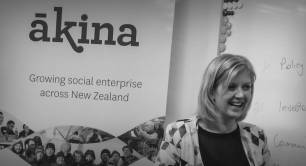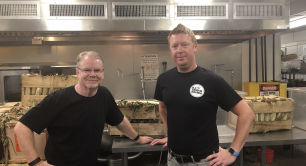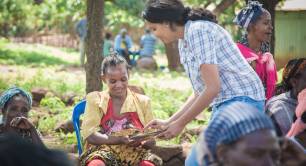Chain Reaction: “Passion is the fuel”
September’s Social Enterprise World Forum (SEWF) will this year be taking place in one of the UK’s biggest hubs for social impact: Edinburgh. Pioneers Post is delighted to be attending as media partner, bringing every corner of the debate and insight straight to our readers.
Our SEWF preview series, Chain Reaction, sees our journalists handing the reins to social entrepreneurs, in a continuous chain of interviews which will extend around the globe.
In this edition, our previous interviewee Melat Yosef, founder of Ethiopia’s VitaBite, speaks to Ailsa Clark, development manager at InspirAlba, who is supporting community based organisations to turn their ideas into sustainable business activities in Scotland.
Separated by thousands of miles, the two women compared the challenges of balancing a family and a career, as well as the nuances of supporting social enterprises in rural economies.
Melat Yosef: Hi Ailsa. So I tried to read a bit about InspirAlba but I couldn’t actually find that much information... Could you explain what you do and how you do it?
Ailsa Clark: Yes apologies about that, our website has had some problems and has only just come back up!
I’ve lived and worked in Argyll in Scotland for many years, having grown up in the region. Previously I had experience working in the public sector, running employability programmes, getting young unemployed people back into work and working with a lot of community based organisations. Often there's a huge amount of energy and enthusiasm in rural communities but sometimes the stumbling block is the ability to deal with some of the bureaucracy and develop effective business models.
So I started InspirAlba as a social enterprise in 2009. We set up to help organisations turn their ideas into robust business activity - helping them to secure funding and investment, and take project activity forward through action plans.
MY: What has been the achievement you’ve been most proud of?
AC: Part of what we do is reinvest some of our income into supporting employability opportunities, so over the years we’ve probably supported in the region of 40-50 employability opportunities with a range of social enterprise partners. We’re giving people access to employment with a wage, which helps them build confidence too.
MY: So what lessons have you learnt in the last ten years?
AC: That’s a hard one! I guess one thing is that it’s always about learning - every day you’re working with different organisations that are involved in different areas of work. For example, one day it might be a small community that want to sustain a local fuel filling service, so you have to learn about insurances for running a fuel service. And the next day you might be working with a cinema and after that a youth service. The core themes are the same, but it’s about how you can manage them in sometimes quite challenging circumstances.
People are very inspired in a lot of the groups and organisations I work with but there are challenges along the way
MY: What advice would you give to young entrepreneurs who are thinking about social enterprise for the first time?
AC: I think in a world where so much is made of material things it’s important to recognise the value in other aspects of life. You may not get rich quick but there’s a huge amount of value and wealth in the people you meet, work with and the communities you engage with which perhaps gives you more than the wealth itself.
Each and every one of us can make a contribution in some way to our community. Social enterprise is just a different model that allows you to do that - you can be creative and channel your energy into something that you care about and that you’re passionate about, and that’s important when you’re looking at your work-life.
MY: Yes I totally agree, passion is definitely the fuel when you set up a social enterprise.
AC: Definitely, and to be honest, I think that was one of the key triggers when I set up InspirAlba. People are very inspired in a lot of the groups and organisations I work with but there are challenges along the way. Whether that’s to do with the bureaucracy of funding applications or meeting various requirements to take their business activity forward - it’s that passion and determination that allows you to connect with them and find a way forward. Hopefully what we bring is an element of support that helps them overcome these challenges.
MY: Great, so how do you balance the commercial demand of your business with the impact that you bring?
AC: That’s always a challenge I guess. We’ve always done an element of in-kind work and it’s just a case of getting a balance of that sort of work and work that we’re paid for. Sometimes we get it right, sometimes we don’t, but it’s a case of having that ongoing review. And I’ve got a very good board, they are good at asking critical questions and giving honest feedback.
MY: I definitely think making your social enterprise sustainable is a challenge all over the world, that’s one of our biggest hurdles.
So besides the challenges you just outlined, what is the biggest challenge you’ve had to overcome to get to where you are now?
AC: I have a young family so it’s getting the balance between work that I’m passionate about and family life. It’s also having flexibility to work at different times so that you can be there for your family. The area that we work in is very large, so that can mean you have to be away from home and long days, but it's also good when you get home and have time to recharge.
MY: Yes that’s really important. I have two kids and balancing my career and my role as a mother is always a challenge.
So, what’s next in your career?
AC: Often a lot of the activity in rural areas tends to be very locally focussed and not necessarily interested in growth or expansion, but hugely important to the sustainability of fragile rural communities. We’ve doing a lot of work specifically looking at the particular skills that are required to sustain rural social enterprise as well as support networks in them. This includes assisting entrepreneurs and volunteers to learn from each other and collaborate to improve business activity, and perhaps secure more stable contracts.
MY: What are you looking forward to at the Social Enterprise World Forum in September?
AC: I think it’ll be good to meet with people from all over the world that are involved in social enterprise. It'll be nice to introduce people to some of the inspiring work going on in Argyll and our communities, as well as sharing learnings with people from different parts of the globe.
MY: I’m also excited to be part of SEWF 2018 and I hope that it’ll be a good learning experience for all of us that are passionate about the work we’re doing.
Interview facilitated by Sasha Gallick. Look out for the next link in this interview chain when Ailsa Clark will be taking the interviewing chair – coming soon.
The 10th Social Enterprise World Forum will take place from 12-14 September 2018 in Edinburgh. Pioneers Post is media partner to the event. See our Social Enterprise World Forum collection for more.



